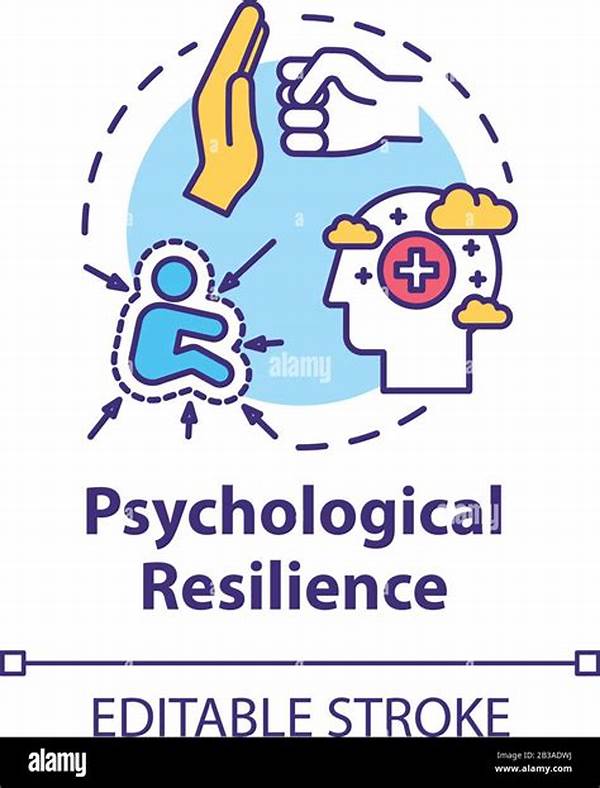
Psychological Resilience In Crisis
- Daniel Anderson
- 0
- Posted on
In times of turmoil and uncertainty, the human spirit often taps into a profound capability, steering through adversities with remarkable strength. This capability, known as psychological resilience in crisis, is our mental and emotional buoyancy that helps us withstand life’s tempests. But what exactly fuels this resilience, and how can we enhance it in challenging times? Let’s delve into this compelling topic.
Read Now : Campaigns To Prevent Impaired Driving
Understanding Psychological Resilience
Navigating the choppy waters of a crisis requires more than just grit. It demands psychological resilience in crisis, a superpower-like trait that keeps individuals afloat when life throws curveballs. Picture it as your mental fitness level: the stronger it is, the better you tackle hardships without losing steam. It’s like flexing your emotional muscles, letting you bounce back with flair no matter the dire straits. Whether it’s a personal setback or an unprecedented global event, resilience propels us forward, reminding us that setbacks are setups for comebacks. So, as we grapple with various crises, nurturing this mental fortitude is key.
Elements of Resilient Hearts
1. Grit and Grind: Ever heard of staying power? That’s psychological resilience in crisis talking. It’s the inner steel that helps you hustle through hard times, keeping your chin up regardless of setbacks.
2. Mental Gym: Think of this as your brain doing push-ups, building stamina and strength to weather adversity with style.
3. The Comeback Kid: When life knocks you down, psychological resilience is what lets you rise, dust off, and get back in the game with newfound gusto.
4. Chill Vibes Activation: When stress grips, resilience enables a calm, composed vibe, ensuring you’re less frazzled under pressure.
5. Hope Hustle: It’s the ability to flip the script, finding silver linings and possibilities even in bleak scenarios.
Cultivating Resilience Daily
Understanding the key components that contribute to psychological resilience in crisis is just the beginning. It’s essential to integrate them into our lifestyle, much like a daily ritual. For example, embracing a growth mindset can make life’s hiccups seem like stepping stones rather than stumbling blocks. Breathing exercises, meditation, and mindfulness practices are like a mental warm-up, prepping you to handle anything that comes your way. And let’s not forget the role of social support—leaning on friends and family is like having an emotional safety net.
Staying connected with loved ones can vastly enhance one’s psychological resilience in crisis, as shared experiences and mutual support often provide a solid foundation during adversity. Plus, cultivating a positive attitude is crucial. This doesn’t mean ignoring life’s hurdles but viewing them as opportunities for growth. These practices are like vitamins, fortifying your mental health and resilience to help you navigate choppy waters with an unshakeable spirit.
Real-World Slang of Resilient Minds
1. “Levelling up” life’s game by leveraging psychological resilience in crisis to unlock new potential amidst challenges.
2. “Bounce Back Ninja” refers to the quick recovery mojo seen in resilient individuals during tough times.
Read Now : Nutrient-rich Plant-based Recovery Smoothies
3. “Chillax Pressure Cooker” describes the cool-headed nature one develops thanks to psychological resilience.
4. “Mental Mojo” highlights the agility and strength derived from nurturing resilience in chaotic times.
5. “Hope Dealer” portrays someone who persists in optimism and resilience despite facing life’s curveballs.
Building Resilience in Tomorrow’s World
Amidst increasing world complexities, psychological resilience in crisis plays a pivotal role, acting as our trusty survival guide. This inner fortitude doesn’t just happen overnight—it’s a skill honed over time. Think of it like crafting a masterpiece; it’s a work-in-progress requiring constant touch-ups, challenges acting as gritty paints on life’s canvas. We all know the stakes are high; modern life throws stress our way like confetti at a parade. Yet, it’s resilience that shapes how we perceive and tackle these obstacles. A positive outlook can turn potential disasters into just another chapter of learning.
In this hustle-bustle world, fostering resilience is akin to sharpening our survival tools. Connections with others, a sense of purpose, and adaptability boost our psychological resilience in crisis. This is not just a trend but an essential skill, a necessity to thrive amid chaos. These times call for flexibility, making life’s curveballs an opportunity rather than setbacks. Thus, nurturing resilience becomes paramount, shaping a coping mechanism empowering us to transform adversity into triumph.
Navigating Crises with a Resilient Spirit
In the grand scheme of life, setbacks serve as dress-rehearsals for a more significant show. Embracing psychological resilience in crisis ensures we’re always ready for the main event. It’s like customizing a toolkit full of tricks to face adversity head-on. Armed with this toolkit, individuals don’t just survive—they thrive, even in unforgiving terrains.
Developing this resilience involves understanding our limits and pushing past discomfort to emerge stronger. Instead of viewing external crises as detriments, resilient minds view them as opportunities to evolve and adapt. This powerful skill set allows individuals to navigate life’s hurdles more effectively, often surprising themselves with newfound capabilities. Psychological resilience in crisis isn’t just a buzzword; it’s a paradigm—a new lens through which we view life and its myriad challenges. With the right mindset and tools, weathering life’s storms becomes second nature, highlighting the indomitable spirit residing within us all.